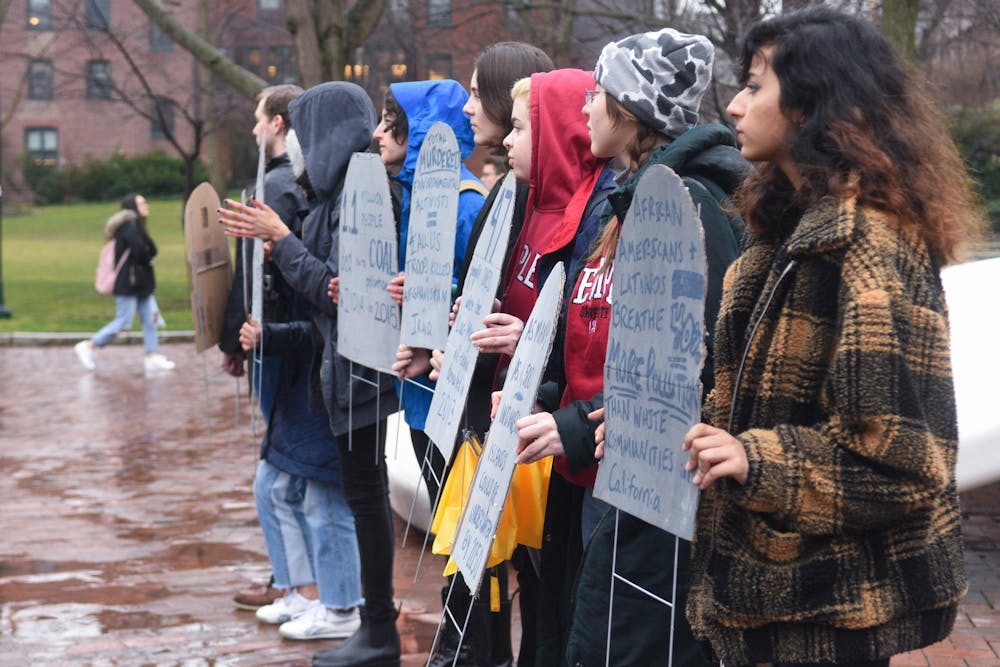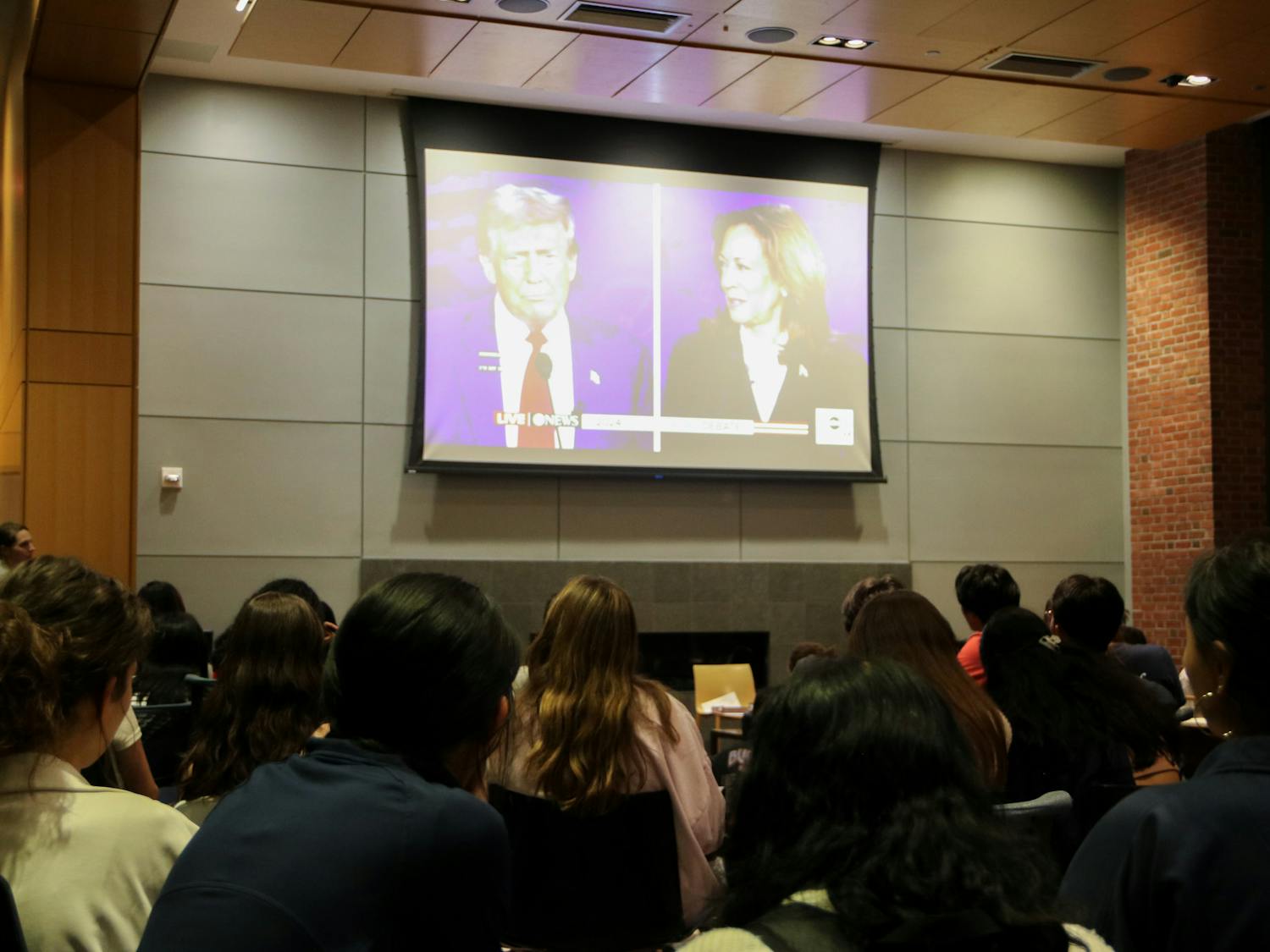The rain did little to stop Fossil Free Penn from demanding that Penn and other universities divest from fossil fuels by protesting outside of Van Pelt Library on Thursday afternoon.
Feb. 13 marked the third annual Global Divestment Day, with students from over 50 college campuses across the United States, Canada, Nigeria, and Kenya protesting for fossil fuel divestment, climate action, and racial and environmental justice. FFP members and other local students stood in a straight line outside of Van Pelt, holding 40 hand-painted gravestones that depicted the costs of investing in fossil fuels and the human lives claimed by climate change.
Although Penn recently announced it will restrict its investments program by not investing in the coal and tar sand industries, enter a Power Purchase Agreement which would give the campus green electricity, and purchase carbon offsets to neutralize emissions from University-sponsored air travel, FFP members have voiced their dissatisfaction with these measures and their intention to continue protesting until their demands are met.

The 40 hand-painted gravestones depicted the environmental and human costs of investing in fossil fuels.
College sophomore and FFP coordinator Maeve Masterson said the goal of the protest wasn't "necessarily about targeting specific University administration, but more so displaying a unified front on the critical issue of climate change, as well as the divestment movement at large.”
One gravestone read: “Seven hundred million people will be forced to emigrate by 2050.” Another stated: “One-fourth of the world’s glaciers will be melted by 2030.”
Engineering junior Ari Bortman, Engineering sophomore Emma Glasser, College senior Jacob Hershman, and College sophomore Micah Kanter, all of whom are FFP coordinators, took turns standing in the middle of Locust Walk shouting statistics about the implications of fossil fuel investment and climate change.
The protest captured the attention of students, faculty, and visitors. Many offered a quick glance before continuing on their walk, while others stayed to hear the protesters and read the gravestones.
RELATED:
In a bid to achieve carbon neutrality, Penn will offset emissions of University air travel
Phila. students talk climate change and poverty at event sponsored by Penn Paideia course
FFP coordinators said they were pleased with the turnout of about 25 protesters – not including the numerous passersby – especially considering the unfavorable weather conditions.
“On a rainy day, it’s really hard to get people out, and we were worried about it,” Bortman said. “But we [got] tons of foot traffic, tons of people stopping and listening to the facts. And that’s really what we were shooting for today. That’s the impact we really want to have.”

FFP members held a large banner, colored orange to represent the international color for fossil fuel divestment.
Some passersby said they were impressed with the students’ dedication.
Observer David Bones said that the older generation has not made climate change a priority, and he appreciates youth activists for taking on the responsibility.
“Obviously, current older folks like myself aren’t really getting the job done, so it’s really encouraging to see younger folks really passionate about this, and networking and working together to make a real change,” he said.
Among the protesters were students from Drexel University and Temple University, who are in the process of expanding their own universities’ divestment movements.
Temple junior Julia Rudy said she came to show solidarity, and Drexel junior Melody Wu added that her goal was to collaborate and form a Fossil Free Philadelphia organization to highlight that the issue is not just specific to any one school.
Echoing Rudy and Wu, Bortman said he thought the most powerful part of Tuesday’s protest was that it was not just about Penn.
“This is the largest day of coordinated action for the movement in history,” he said. “Just a huge step in working together to show that students are not going to accept the status quo of investing in companies that intentionally spread false science, and intentionally take advantage of minority communities.”

The rain did not stop members from attending the hour-long event.
Philadelphia itself is home to minority communities that are susceptible to the ramifications of climate change. Of the 38% of Philadelphians living within a one-mile blast zone of oil train explosions, 58% are people of color.
Despite FFP's focus on both climate and racial justice, the protesters were mostly white, which Masterson said she recognized as a concern.
“It’s tough because you have to make sure that these messages are heard on campus and that there’s pressure placed on our administration, but also make sure that you’re not taking up space for minority groups to be able to express their own concerns,” Masterson said.
Bortman said he thinks the most important part of the national divestment movement is to acknowledge that the minority populations who are less responsible for causing climate change are those disproportionately affected by it. He said FFP is doing everything it can to make their voices heard and stand alongside them.
“We attend institutions that have the power to most acutely combat this injustice, and they are not,” Bortman said. “And that drives us to get out here every day to stand not just for our own futures, but for the futures of people whose lives are being destroyed for no fault of their own.”









